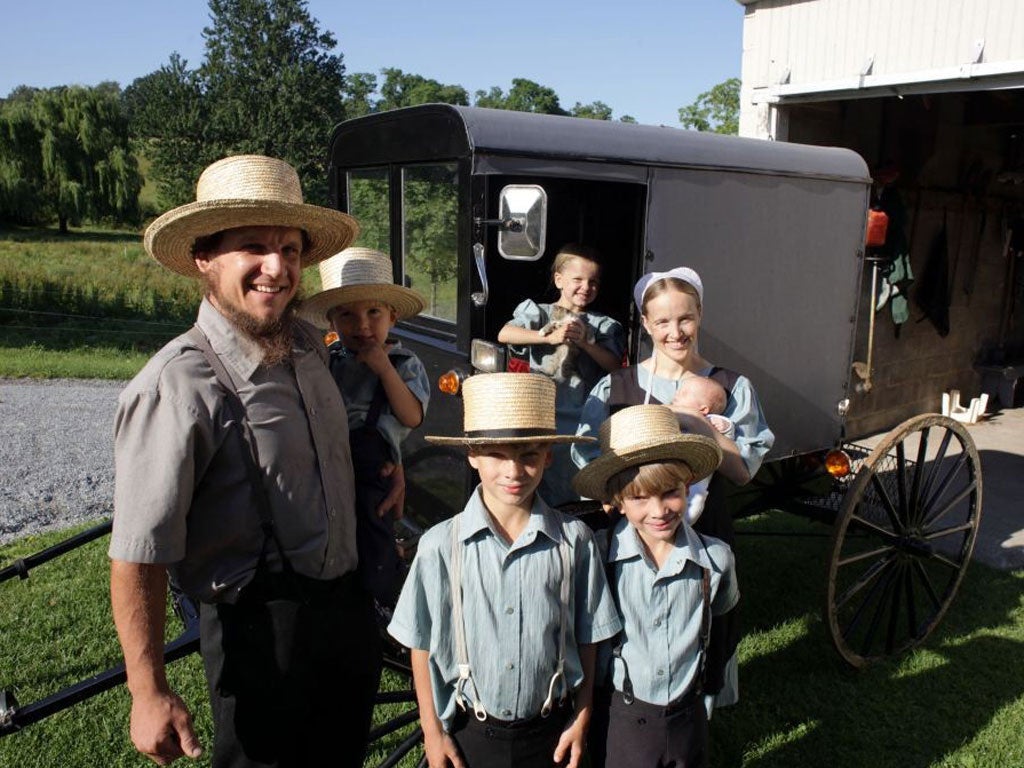Amish: A Secret Life, BBC2, Thursday Vexed, BBC2, Wednesday
The look is familiar, but the Amish remain hard to know, despite this window into their world

Your support helps us to tell the story
From reproductive rights to climate change to Big Tech, The Independent is on the ground when the story is developing. Whether it's investigating the financials of Elon Musk's pro-Trump PAC or producing our latest documentary, 'The A Word', which shines a light on the American women fighting for reproductive rights, we know how important it is to parse out the facts from the messaging.
At such a critical moment in US history, we need reporters on the ground. Your donation allows us to keep sending journalists to speak to both sides of the story.
The Independent is trusted by Americans across the entire political spectrum. And unlike many other quality news outlets, we choose not to lock Americans out of our reporting and analysis with paywalls. We believe quality journalism should be available to everyone, paid for by those who can afford it.
Your support makes all the difference.What goes "Clip-clop, clip-clop, clip-clop, bang bang, clip-clop, clip-clop …"? An Amish drive-by shooting. The neo-puritans of Pennsylvania, who live in rural seclusion on farms without electricity or modern conveniences, have been considered both figures of fun and objects of admiration ever since they featured in Peter Weir's magnificent film Witness. The community itself, however, probably wasn't grateful. Its strict rules ban photography and posing for photographs, and doesn't encourage intimacy with the sinful world of shopping malls and multiplexes. So all praise to Lynn Alleway for finding a family who agreed to appear in her documentary, Amish: A Secret Life.
Not that it was easy. In the early encounters with David and Miriam Lapp (the surname of Kelly McGillis's character in Witness), the makers begged to have the black blinds removed from the windows so indoor filming would be possible. Their attempt to film a church gathering was flatly refused, though they were invited to the service – three hours sitting on hard benches listening to prayers in Amish German.
David, a dead ringer for Woody Harrelson, explained that nothing should distract from the essential business of "family time together and reading the Bible", though this didn't stop him running a small construction company. He explained that he'd let the cameras in to spread the Word. Saying grace before dinner, he asked God "to allow the BBC to bring honour and glory to you, Jesus", something that is not, I believe, in the corporation's original charter. His wife Miriam, a shining-eyed, perma-smiling, nun-like beauty, struggled to imagine what British viewers would make of their life. "The only thing I know about Britain," she said, "is the prime minister Tony Blair and your Queen and King."
Thanks to Peter Weir, we know a lot about them, at least the visual surface of their lives. The straw hats, the braces, the interchangeable beards, the 18th-century horse-drawn buggies were all entirely familiar. Alleway's camera lingered on the faces of the Lapps' astonishingly beautiful children and shot predictable images of Amish simplicity versus modern Bedlam – look at that horse and trap becalmed at a noisy traffic intersection – but struggled to penetrate the firewall of earnest religiosity. In the best sequence, a long-lens camera spied on the Amish faithful gathering at dusk: a soaring choral setting of Pachelbel's Canon, the buggy lights in the gloaming, the horses' steaming breath, the children's sombre clothes, the men's purposeful walk …. It was wonderful, but it worked because it underlined our exclusion from this strenuously private society.
Towards the end, more families agreed to be filmed with the Lapps, thereby risking being shunned by their elders and peers. For a moment, rebellion seemed in the air – the Amish Spring. But the film fizzled out in a fusillade of questions about the threat of excommunication. Alleway succeeded in making lovely Miriam cry, but didn't enlighten us about the stuff we really wanted to know: how American do the Amish feel? What do they think of Mormons? If David runs a company, does he use an Amish accountant? And what would an Amish tax shelter look like?
Meanwhile, the second series of Vexed, possibly the most irritating cop show ever known, got under way. It's billed as a "comedy-drama police procedural", a portmanteau phrase that chills the blood. It stars Toby Stephens as DI Jack Armstrong. Jack is cool, laconic, leather-jacketed and drives an old Mercedes sports car. He's a flirtatious ladies' man. He doesn't play by the rules. He has no time for research or paperwork. For some reason he speaks with a mid-Atlantic drawl ("We're working on the assumption that he died from a bloadertha head."). To his horror, his new partner is cool, feisty, know-all feminist DI Georgina Dixon (Miranda Raison) who's a better driver than he, interrupts his poker game to check on progress, and raises a half-indulgent eyebrow at his rampant sexism. Wearing a coat zipped up to the neck, she's basically Emma Peel from The Avengers, and Ms Raison plays her with watchable spirit and aplomb.
God knows what Stephens thinks he is, but his character comes across as an 18-carat arsehole. And God knows what BBC2 is doing giving air space to this queasy, misconceived hybrid of Dempsey and Makepeace and Carry on Copper.
Join our commenting forum
Join thought-provoking conversations, follow other Independent readers and see their replies
Comments